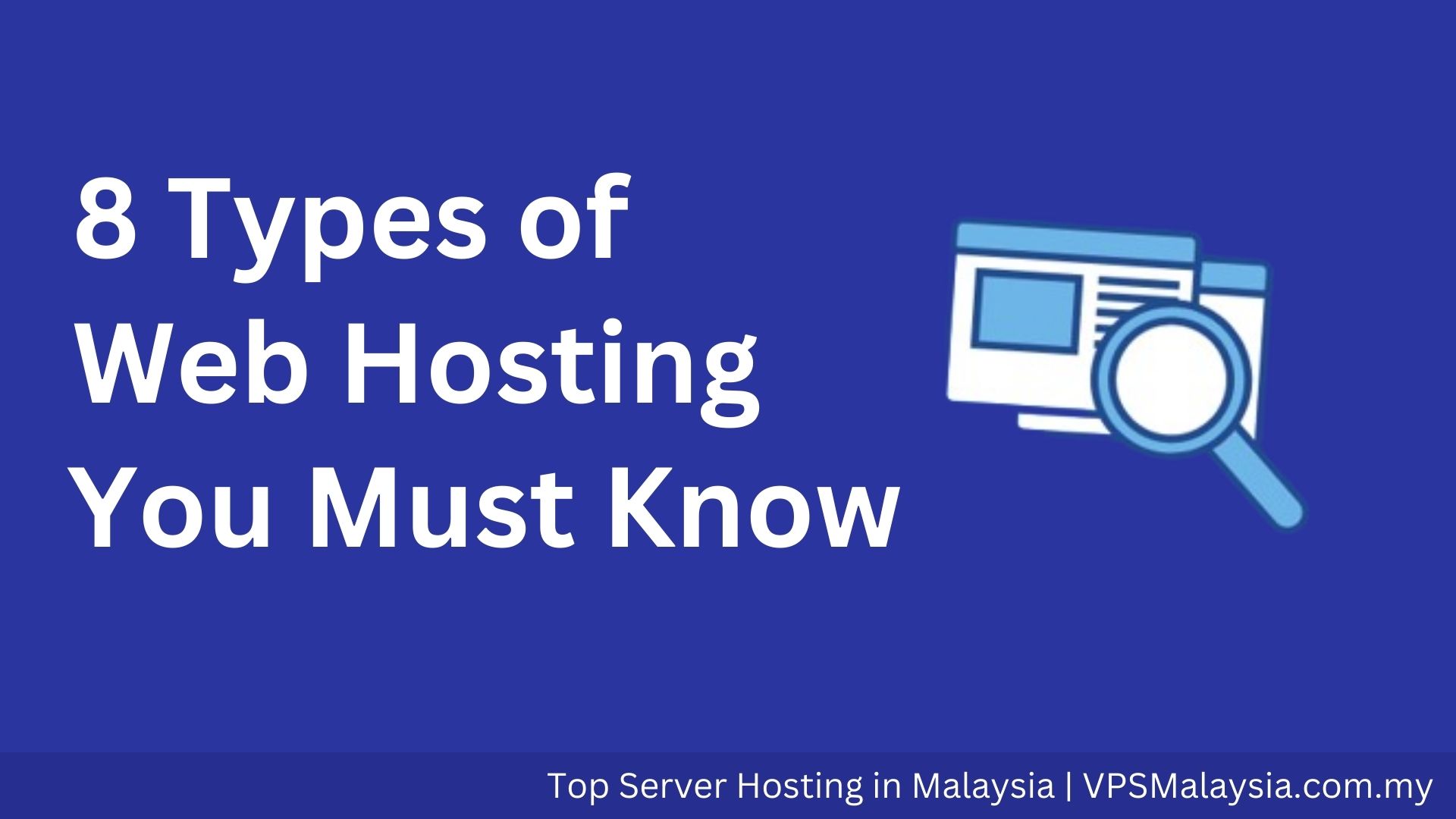Picking the best web hosting for your website can be challenging because there are many choices. You can choose the one that best fits your online business. Many companies claim to offer the best web hosting, but you need to do some research to find the most trustworthy one.
Today, we’ll discuss 8 types of web hosting that many people use for their businesses. It’s essential to learn about all the 8 types of web hosting before you decide. Look at these popular types of web hosting services to find the right one!
Basics of Web Hosting
In this part, we’ll learn about web hosting—what it is, how it works, and why it’s essential for making websites work well.
Web Hosting
Web hosting is a service that allows individuals and organizations to make their websites accessible via the World Wide Web. It involves renting space on a server, a powerful computer connected to the Internet, to store and serve the files such as pictures, videos, and pages that make up a website.
It works like renting space on the internet to keep the files of a website. When someone wants to visit a website, they type its name into their web browser. Then, the browser asks the server where the website is stored to send the files. The server sends the files to the browser, and the website appears on the screen.
The Role of Web Hosting in Website Performance
Web hosting is super essential for a website’s performance. The server’s speed, how often it’s online, and how much data it can handle can affect a website’s performance. Server speed is how fast the server can return to your computer when you request a website. If it’s fast, the website loads quicker, and you don’t have to wait.
Uptime is about how much time the server spends online and is ready for you to use. If it’s online a lot, you can visit the website whenever you want without any problems.
Web hosting in Malaysia
Making Money
People think web hosting Malaysia business will be worth about US$0.60 billion by 2024 and grow by about 24.90% yearly. That means by 2028, it might be worth about US$1.46 billion!
How Much People Spend
In 2024, each person in the web hosting business might spend about US$35.451 on average.
What People Want
More and more people in Malaysia want web hosting because there are more online businesses now.
People in Malaysia like web hosting services that are:
- Fast
- Reliable
- Easy to use
They would like it even more if the servers were in Malaysia because that would make things load faster and work better. They would like it when the service can grow with their business.
#8 Popular Types of Web Hosting Services
There are several types of server hosting: shared hosting, dedicated server, virtual private server, and cloud server. Each has its advantages and disadvantages from the aspects of specifications and pricing.
To choose the one that best fits your business or personal needs, you must first understand the pros and cons of each type of server hosting among these 8 types of web hosting and their differences.
1. Shared Hosting
Shared server hosting is suitable for small or beginner websites. It means your website lives on a computer with lots of other websites. This is the fundamental way to put your website on the internet. When you use shared hosting, your website shares space and power with other websites. This is okay because there’s enough for everyone.
Shared hosting is cheap because the computer costs little to run with many websites. But, if another website on the same computer gets popular, your website might slow down. That’s because the computer is busy handling all the visitors to the other site. Unfortunately, you can’t do much about it since you all share the same computer.
Note: VPS Malaysia offers Cheap web hosting services. They’re great for sharing your website with others.
Advantages
- Cost-effective
- Easy to set up
- No required technical know-how
- Perfect for beginners
Limitations
- Not scalable for all businesses
- Lower uptime rates and slower loading times
- Shared server resources
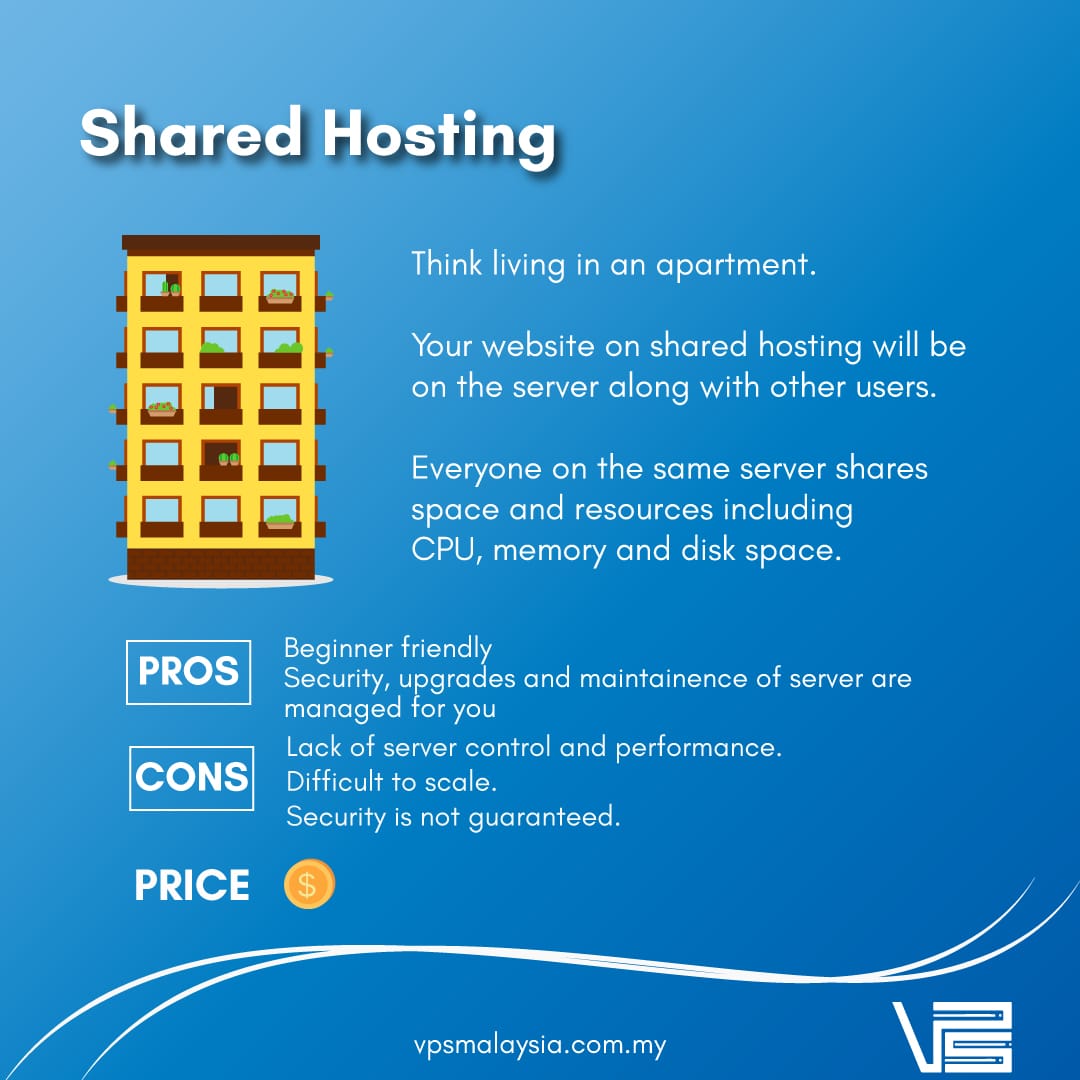
Who Should Use Shared Server Hosting?
Shared server hosting is excellent for people who have basic websites or are just starting and need to learn more about technical stuff. It’s cheaper because you share the server with others, which is suitable for bloggers and small business owners.
2. Dedicated Hosting
A dedicated server is like having your very own special place on the internet. They’re the best way to host a website because you get your server just for it. You don’t have to share it with anyone else.
When you use dedicated hosting, your website gets many good things you don’t get with shared hosting. Your website stays up more often, and it loads faster. That’s because it doesn’t have to share resources with other websites.
Note: Dedicated Hosting of VPS Malaysia is popular for its high-performing servers.
Advantages
- Complete control over the server setting
- The whole server belongs to your website alone
Limitations
- Expensive to use
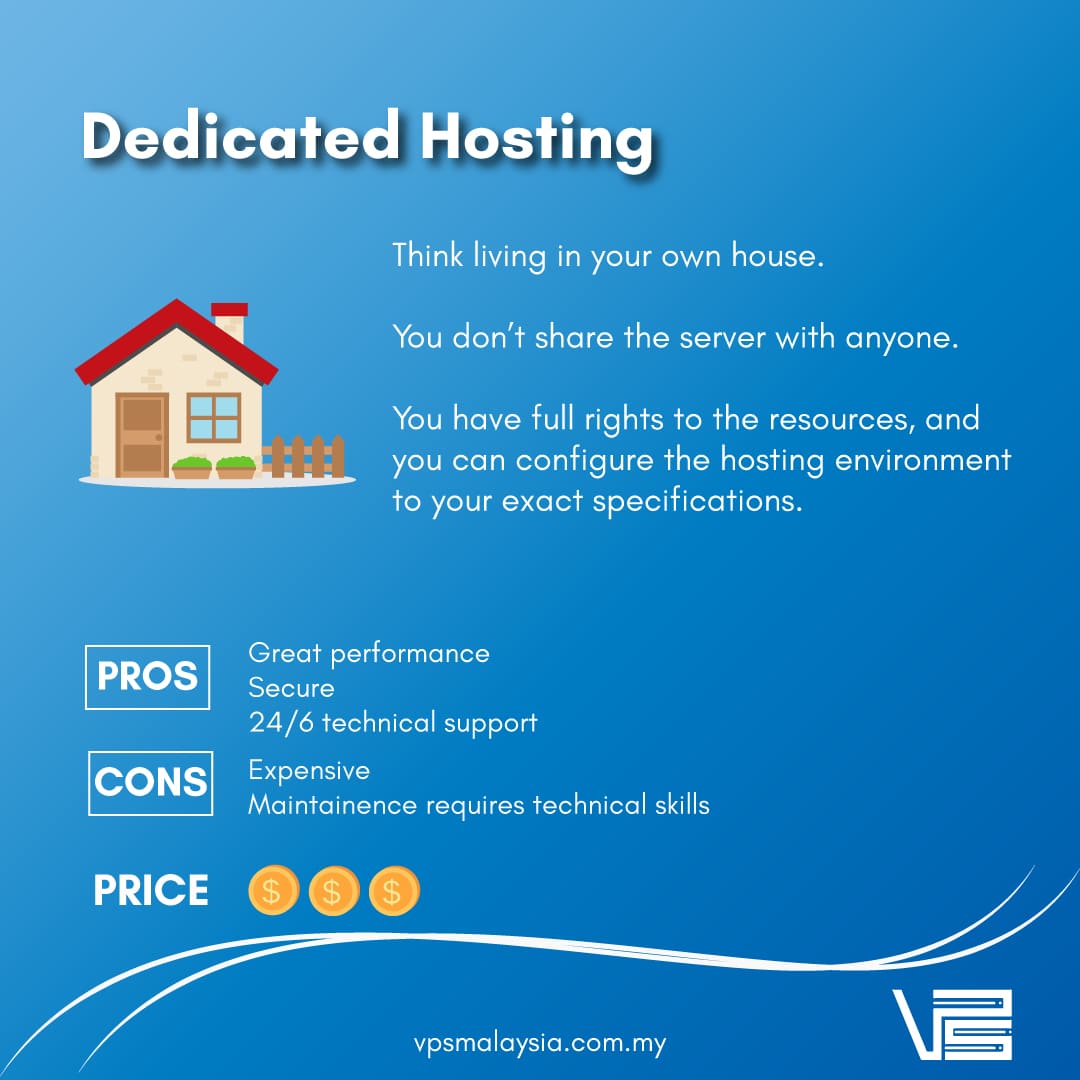
Who Should Use Dedicated Hosting
Dedicated hosting Malaysia is excellent for websites that need lots of power and control over their servers. It’s best for businesses with enough money to pay for it.
3. Virtual Private Server (VPS) Hosting
VPS hosting is more advanced than shared web hosting. If a website needs more space on a particular server, the owners might switch to a virtual private server. This hosting is unique because each website gets its area on the server, even though they’re all on the same physical server as other users.
When you use VPS hosting, you still have to share the server with other websites, but fewer than with shared hosting. Each website can change its virtual server since one server is divided into many virtual servers.
Note: VPS Malaysia is the most excellent company offering VPS hosting plans online.
Advantages
- Custom configurations for your server
- Increased fast loading speed and uptime rates
- Cost-effective
- Larger storage space
Limitations
- Sharing the central server with other websites
- Limited control
- More technical to set up than a shared server
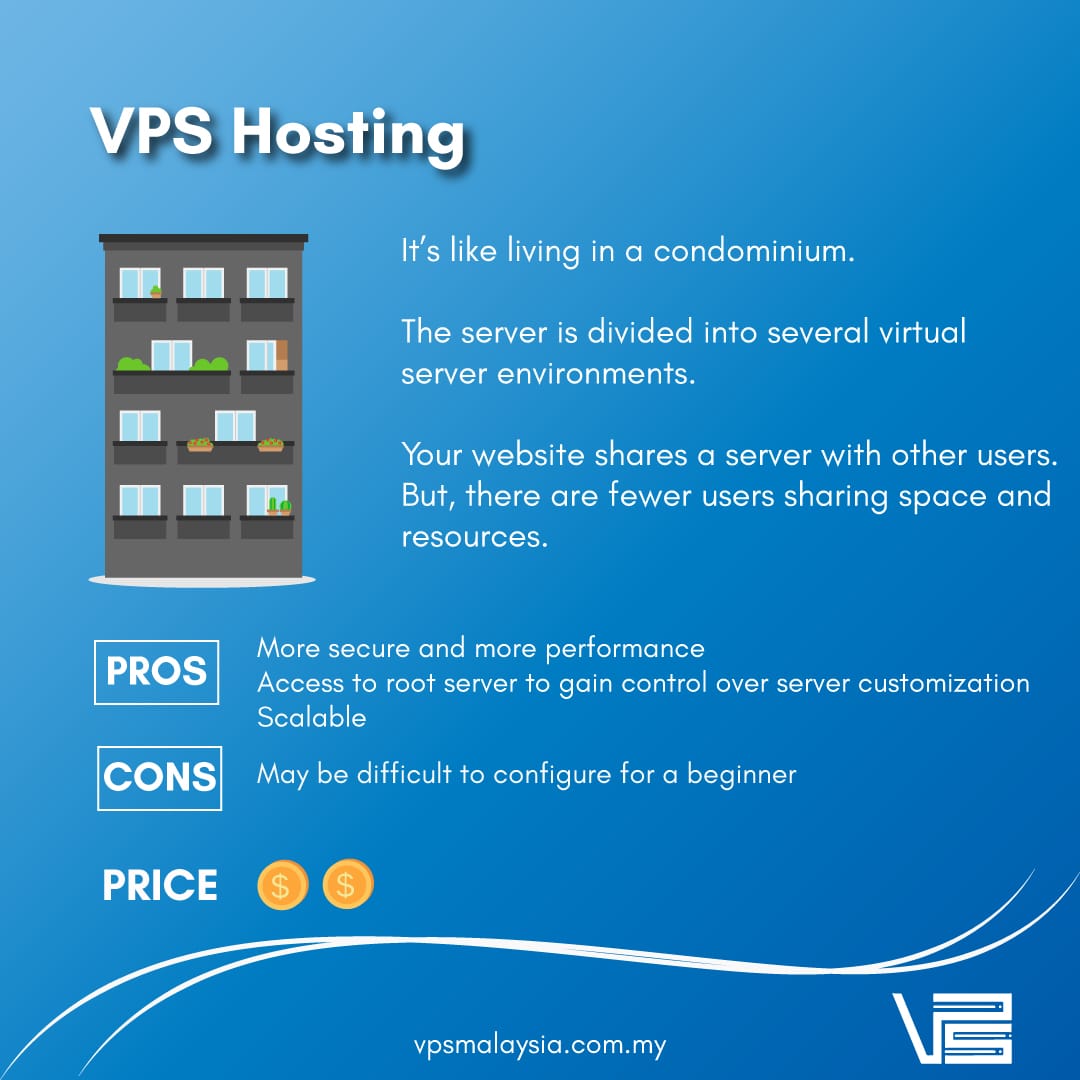
Who Should Use VPS Hosting
VPS hosting is excellent for people who want to manage their website’s server. If you run a small or medium-sized business and you’ve grown too big for shared hosting, VPS hosting might be right for you.
Shared hosting can’t handle the demands of a growing business. If you like to tinker with technology or run a popular blog or website, VPS hosting lets you customize things just the way you want.
4. Cloud Hosting
Cloud hosting is like having super-powered web hosting. It can handle lots of people visiting your website without any problems. It’s better than regular hosting because it’s like having many computers working together. With cloud hosting, if one computer has a problem, other computers help. Cloud hosting costs less than some different kinds of hosting.
Note: Cloudways and Hostwinds are the top companies that provide cloud hosting.
Advantages
- Scale server resources on demand
- Highly secure
- Server customization
- Less unexpected downtime due to server error
Limitations
- A complicated payment structure
- Unexpected traffic spikes can increase costs
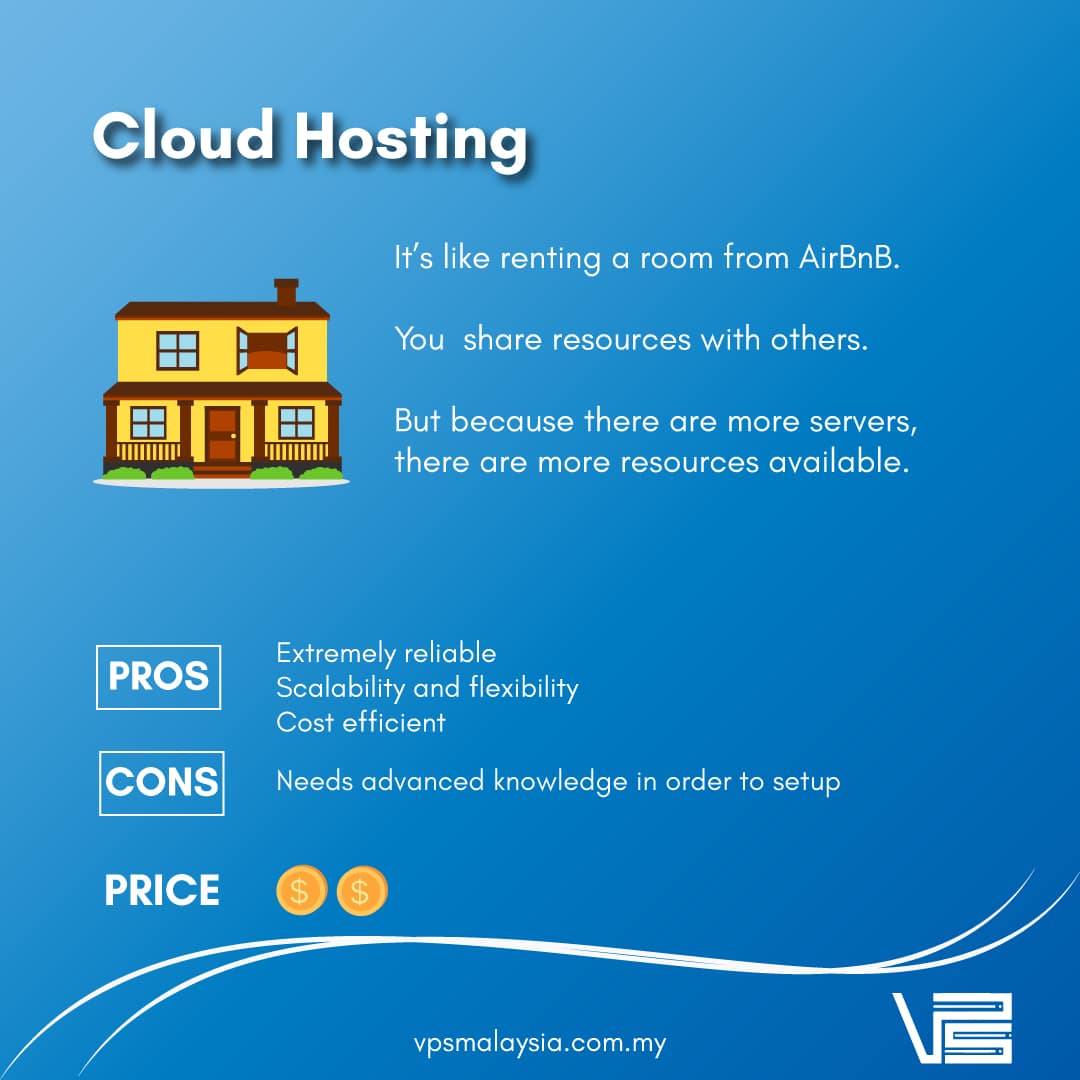
Who Should Use Cloud Hosting
Cloud hosting is great for big and medium businesses growing fast online. If your website gets many visitors at unexpected times, cloud hosting can help. It’s like having a flexible space for your website to grow and handle more visitors without problems.
5. Reseller Hosting
Reseller hosting is when you sell hosting services to other people. You buy hosting from a big company and then sell it to your clients. You can decide how much to charge your clients, but remember, you must also pay the big company for the hosting.
Reseller hosting can earn you a good amount of money. When you sell hosting to others, you make a profit. Most companies that offer reseller hosting let you choose how much to charge.
Note: A2 Hosting has fast and safe reseller hosting.
Advantages
- An upgrade to your existing service
- Additional avenue to generate income
- You have total control of the hosting experience
Limitations
- Requires a reasonable number of clients.
- High responsibility for maintenance and support
Who Should Use Reseller Hosting
Reseller Hosting is great for people who make websites, computer experts, companies that provide hosting, and other internet businesses.
6. Managed Hosting
Most hosting packages you find online are likely to be managed. Managed hosting is like having a helper, not just a hosting plan. Companies that offer private web hosting provide technical support. They help set up software and hardware, make backups, set configurations, and monitor security.
Note: DreamHost’s special control panel is simple to use and removes the worry of handling your website hosting.
Advantages
- Handles the maintenance tasks for you
- Optimization of website performance
Limitations
- More expensive
- Less control over the site’s optimization and server configuration
Who Should Use Managed Hosting
Managed hosting is excellent for people with websites who want to avoid worrying about doing maintenance work themselves.
7. Colocation Hosting
Collocation means putting your servers in a particular place instead of keeping them at your office or renting someone else’s servers. If you have your servers, you can put them in this special place. You’ll pay for things like electricity and internet, keeping the servers cool, having a particular address, and ensuring they work right.
You must bring your storage, servers, and stuff to connect them. You’re also responsible for ensuring the server’s software works right, setting up their Internet addresses, and fixing them if they break.
Note: Equinix hosting stuff online uses excellent security to keep its data centers safe. It has special equipment and ways to ensure only the right people can access them.
Advantages
- It is cheaper than using an on-premises data center
- Total control over your equipment
- Great option as a disaster recovery site
Limitations
- Costly for small businesses
- Technical knowledge required to run
- Long-term commitment
Who Should Use Colocation Hosting
Colocation is excellent for big and medium-sized businesses that still need their server setup.
8. WordPress Hosting
WordPress is a trendy way to manage websites, especially for people just starting their businesses. There are two main kinds of WordPress hosting.
Shared WordPress Hosting: With this one, the website owner must put WordPress on the hosting before using it. It’s like sharing a house with other people. Some of the best hosting services for WordPress are Bluehost and SiteGround.
Managed WordPress Hosting: This kind comes with extra cool features, like making your site load faster and keeping it safer.
Note: Hostinger is an excellent choice for people who want to create business websites.
Advantages
- Optimized for WordPress
- Enhanced security for WordPress sites
Limitations
- It could be more flexible.
- Sharing resources with other sites
Who Should Use WordPress Hosting
WordPress hosting is for people who use WordPress and those who want a particular type of hosting made just for WordPress websites.
Types Of Web Hosting Comparison
Picking the right way to host your website is essential, and it depends on a few things, like how much money you have, how much control you want, and how much you know about technical stuff. Let’s look at types of web hosting and what they’re like:
| Hosting Type | Functions | System | Working |
|---|---|---|---|
| Shared Hosting | AffordableShared resources suitable for small websites | Server resources | Shared with other websites |
| VPS Hosting | A dedicated portion of the server is scalable. Ideal for medium-sized websites, | A dedicated portion of the server | More control and resources compared to shared hosting |
| Dedicated Hosting | Complete control over server settings and resources ideal for large websites. | Entire physical server | Complete control over server settings and resources |
| Cloud Hosting | ScalabilityPay for what you use, High availability and uptime, Suitable for websites of all sizes. | Multiple interconnected servers | Scalability and redundancy |
| Managed Hosting | Optimized for WordPressAutomatic updates. Enhanced security.Performance optimizations. | Optimization features | Managed by the hosting provider |
| Reseller Hosting | Resell to own clients. Manage accounts. Provide support. Typically includes large disk space and bandwidth. | Purchase hosting services | Resell to own clients |
| WordPress Hosting | Optimized for WordPress. One-click installation.Automatic updates. Specialized caching.Security configurations. | Optimized for WordPress | Features tailored to WordPress requirements |
| Colocation Hosting | A special place for servers.Paying for electricity.Internet, cooling, and maintenance. | A special place for servers | You bring your storage and servers and are responsible for software setup and maintenance. |
Conclusion
This article explains 8 different types of web hosting to host your website online. Each way has good and not-so-good parts, so you can pick the one that fits your website best. We hope this article helps you find the right hosting. Feel free to share what you think about it in the comments below!

